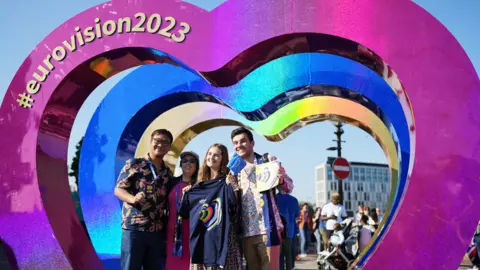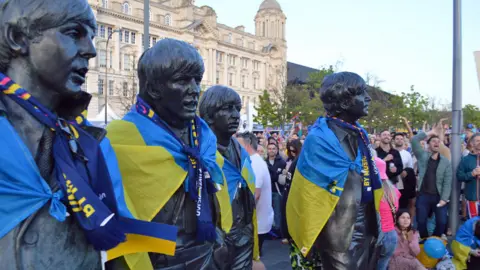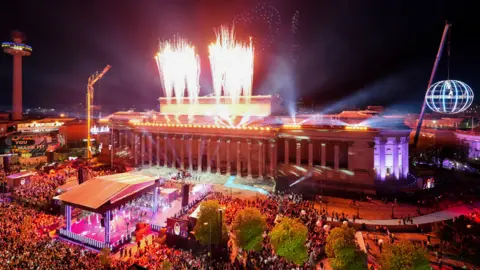Eurovision Song Contest gave Liverpool £55m 'shot in the arm', mayor says
 Getty Images
Getty ImagesMore than 300,000 people attended Eurovision-related events in Liverpool in May, giving the local economy a £55m boost, the council has said.
Fans flocked to the city when it hosted the annual song contest plus a festival of other concerts and cultural events.
In total, 306,000 people visited the city centre for Eurovision events, according toresearch commissioned by Liverpool City Council.
They spent £54.8m in places like bars, hotels, restaurants and shops, it said.
The figures were well above the council's predictions of 100,000 visitors and a £25m economic boost this year.
It had said, before the event, that its outlay on Eurovision-related costs would be £2m, with another £2m coming from the Liverpool City Region Combined Authority.

Liverpool was chosen as the location for the two semi-finals and grand final after the UK stepped in to host the contest on behalf of 2022 winners Ukraine.
The three televised shows were staged by the BBC and reached a global TV audience of 162 million.
The city also hosted a fan village with daily performances on the waterfront, a two-week cultural festival, and other related events.
The council's research also said:
- Eurovision events had total attendances of 473,000, with some people going to more than one event
- The visitors included 31,000 from outside the UK, with fans from 49 countries at the main live shows
- 42% of overseas visitors said it had a positive impact on how they viewed the UK, with 51% unchanged and 5% saying they don't know
- 175,000 city-centre hotel rooms were sold in May - the best month since 2018
- There were 250,000 visitors to the fan village over 10 days
- An audience of 326,000 saw 24 events in the two-week cultural festival
- The education and community programmes directly engaged with 50,000 people
- 96% of visitors said they would recommend Liverpool as a destination to visit
Council leader Liam Robinson said the figures "speak for themselves".
He said: "Jobs were created, local businesses were on the receiving end of a much-needed boost and hundreds of thousands of people came to the city, had a great time and are more than likely to return again."
Jean Philip De Tender from the European Broadcasting Union told the BBC that, out of the host cities that have published economic data, Liverpool is the most successful yet.
"If you embrace it well, which is what Liverpool has done, then you can really reap the benefits out of it," he said.
 Getty Images
Getty ImagesLiverpool City Region Mayor Steve Rotheram added that the city had given fans, whether watching in person or on TV, "a Eurovision they will never forget" and that it was "a vital shot in the arm for our local economy".
Culture Minister Stuart Andrew said: "This research demonstrates the positive impact of hosting major events and I hope that we can continue to build on this success."
Phil Harrold, BBC chief of staff and chair of the 2023 city selection group, said they knew Liverpool would deliver "with a passion and enthusiasm that was second to none".
He added: "The incredible numbers proven in this research, coupled with our own record-breaking audience figures, demonstrate that 2023 was indeed the most successful Eurovision ever and is testament to all who played a part in bringing this year's song contest to life."
Liverpool was the first UK city to host Eurovision for 25 years, with the main shows held at the M&S Bank Arena.
The final was won by Loreen, from Sweden, with the victorious country choosing Malmo to host next year's contest.
